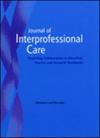在旨在提高家长自主权的产科和新生儿综合护理环境中重新平衡专业身份角色:一项针对医疗专业人员的定性研究。
IF 1.9
3区 医学
Q3 HEALTH CARE SCIENCES & SERVICES
引用次数: 0
摘要
这项以案例为基础的定性研究探讨了在综合产科病房工作的医护人员从医生和护士负责的 "家长式 "模式转变为共同或 "消费者式 "模式以提高家长自主权时所体验到的职业认同。我们分析了与 60 名医疗专业人员进行的焦点小组讨论和访谈记录,了解他们在增强家长能力方面的经验,并描述了与专业身份主题相关的因素。对专业身份影响最大的变化是父母与新生儿之间的距离越来越近以及单户病房的设计。这些变化影响了职业认同的三个主题:(1)联系和关系(2)沟通,以及(3)能力。第四个主题,即价值观、信仰和职业道德,影响了医疗专业人员如何应对前三个主题的变化。在医院环境中增强新生儿父母的能力时,医护人员的职业身份会发生有利和有威胁的变化。与家庭综合护理相关的价值观、信念和道德规范有助于医护人员接受新的角色,但其他价值观、信念和道德规范也会造成障碍。在包容患者的团队中持续发展专业身份是未来研究的一个课题。本文章由计算机程序翻译,如有差异,请以英文原文为准。
Rebalancing of professional identity roles in an integrated maternity and neonatal care setting designed to increase parent autonomy: a qualitative study among health professionals.
This case-based qualitative study explored the professional identity as experienced by health professionals working in an integrated maternal-neonatal ward when their practice changed from a "paternalistic" model, in which physicians and nurses were in charge, to a shared or "consumerist" model, to increase parent autonomy. We analyzed transcripts of focus group discussions and interviews with 60 health professionals on their experiences with empowering parents and described factors associated with themes of professional identity. The changes most affecting professional identity were the constant proximity of parents to their newborns and the single-family room design. These changes influenced three themes of professional identity: (1) connectedness and relationships (2) communication, and (3) competencies. A fourth theme, values, beliefs, and ethics, affected how the health professionals coped with the changes in the first three themes. When empowering parents of newborns in a hospital setting, health professionals experience beneficial as well as threatening shifts in their professional identities. Values, beliefs, and ethics associated with family integrated care helped health professionals to embrace their new roles, but other values, beliefs and ethics could create barriers. Continuous professional identity development in a patient-inclusive team is a topic for future research.
求助全文
通过发布文献求助,成功后即可免费获取论文全文。
去求助
来源期刊

Journal of Interprofessional Care
HEALTH CARE SCIENCES & SERVICES-
CiteScore
5.80
自引率
14.80%
发文量
124
审稿时长
6-12 weeks
期刊介绍:
The Journal of Interprofessional Care disseminates research and new developments in the field of interprofessional education and practice. We welcome contributions containing an explicit interprofessional focus, and involving a range of settings, professions, and fields. Areas of practice covered include primary, community and hospital care, health education and public health, and beyond health and social care into fields such as criminal justice and primary/elementary education. Papers introducing additional interprofessional views, for example, from a community development or environmental design perspective, are welcome. The Journal is disseminated internationally and encourages submissions from around the world.
 求助内容:
求助内容: 应助结果提醒方式:
应助结果提醒方式:


